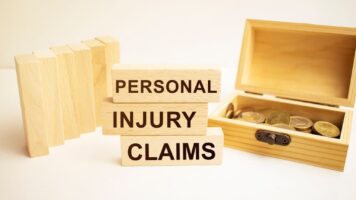Personal injury claims and lawsuits arise when other people behave negligently and carelessly.
In a personal injury case, you can recover monetary compensation not only for your medical expenses and lost income but also for your intangible losses, such as pain, suffering, and inconvenience. To increase your chances of recovering favorable monetary damages for your injuries, you need a skilled personal injury attorney in your case as quickly as possible.
Once you have retained skilled legal counsel to handle your personal injury case, your lawyer can begin advocating aggressively for your legal rights and interests. Specifically, your attorney can gather important claim documents and assemble those documents into a settlement demand package.
Next, your attorney can submit your claim to the appropriate insurance company and begin negotiating fair settlement compensation on your behalf.
Finally, your attorney can pursue litigation in state court if the insurance company will not compensate you fairly for your injuries.
Every step of the way, your attorney will aggressively advocate for your legal interests. Your lawyer can also address all your legal concerns, answer your questions, and represent you at all legal proceedings, including a deposition or settlement conference, civil jury trial, or alternative dispute resolution (ADR) proceeding.
Your attorney will do everything possible to maximize your total monetary damages, making you whole again after your accident. If you’ve been injured in a car accident, seek the expertise of an experienced Cape Girardeau car accident lawyer to navigate your case with legal precision.
What is a Personal Injury Case?
Personal injury refers to preventable harm. If someone else had not acted negligently or intentionally wrongfully, the injury would never have happened. The law recognizes that you should not pay for injuries due to another party’s conduct. It allows you to file a personal injury lawsuit in civil court to seek compensation for your injury-related losses from the liable party.
Most personal injury cases do not go straight to civil court. Instead, they begin with an insurance claim, and only require litigation if the insurance process does not reach a favorable result.
Types of Personal Injury Claims
Personal injury claims and lawsuits have a basis in negligence. In other words, another individual or entity must have acted unreasonably under the circumstances. For example, if your injuries happened in a car accident, the other driver usually violated a traffic law or otherwise drove recklessly or carelessly under the circumstances.
Some of the most common legal bases for a personal injury claim or lawsuit are:
- Motor vehicle accidents, including collisions that involve trucks, cars, bicycles, and motorcycles
- Pedestrian accidents that occur at intersection crosswalks or in a parking lot/parking garage
- Slip and fall accidents that take place on someone else’s premises, where the premises owner knows about a property defect but fails to warn about or remedy it within a reasonable amount of time
- Negligent security incidents where an attack occurs on someone else’s property because the property owner fails to provide enough security cameras or personnel
- Construction-site accidents, where a worker suffers injuries because of a third-party’s negligence
- Boating accidents, where a boat operator fails to properly maintain the boat or drives negligently, causing injuries to someone else
- Defective staircase incidents, where a property owner fails to maintain a staircase properly, resulting in serious injuries
- Escalator and elevator accidents, where property owners fail to maintain these devices in a reasonably safe condition on their premises, thereby causing an accident
If you recently suffered injuries in one of these accidents, you need to involve an experienced personal injury attorney as quickly as possible. Your lawyer can investigate your accident and determine your eligibility for filing a personal injury claim or lawsuit. If you can move forward, your attorney can gather the necessary documents and submit a claim to the appropriate insurance company.
Legal Elements of Proof in a Personal Injury Case
The injured accident victim has the sole legal burden of proof to recover monetary damages as part of a personal injury claim. The at-fault individual or entity need not satisfy any legal burden or prove anything in the case.
First, the injured accident victim needs to establish that the at-fault party owed them a legal duty of care. For example, in a slip and fall accident on someone else’s premises, the accident victim must establish that the property owner owed them a duty of reasonable care to adequately warn about or correct known dangerous hazards on their premises.
Second, the injured accident victim must show that the at-fault party breached their duty of care somehow. For example, in the slip and fall accident context, the property owner must ordinarily have failed to warn about or repair a known hazard on the property within a reasonable amount of time.
Next, the accident victim has to demonstrate that as a direct result of the at-fault party’s negligent actions or inactions, both the occurrence and their injuries resulted.
Proving these legal elements is sometimes an uphill battle, especially when insurance company adjusters become difficult. Therefore, your lawyer can retain one or more experts to testify in your case.
For example, your attorney can retain an accident reconstructionist if the insurance company is disputing fault for your accident. Specifically, an accident reconstructionist can argue that the accident and your claimed injury or injuries share a direct relationship.
Likewise, your lawyer can retain a medical expert to establish the causal connection between the accident and your injuries. A medical expert can also confirm, based upon a reasonable degree of medical probability, that one or more of your injuries are permanent.
Your attorney can ensure your case satisfies the legal burden of proof so that you can recover monetary damages in your personal injury claim or lawsuit.
Common Personal Injuries That Result from Others’ Negligence
When accidents occur because of negligent individuals and entities, victims may suffer serious injuries that leave them in constant pain and suffering. They may also need to undergo significant medical treatment to get better.
The specific injuries an accident victim suffers often depend on the accident circumstances, the amount of force involved in the occurrence, and the particular body parts affected in the accident.
Some of the most common personal injuries that accident victims may suffer include mouth, jaw, and teeth injuries, eye injuries, rib fractures, broken bones, traumatic brain injuries, internal bleeding, internal organ damage, soft tissue whiplash injuries, spinal cord injuries, full and partial paralysis, open lacerations, and bruises.
If you sustained any of these injuries in your recent accident, you must undergo the continuous medical treatment needed to recover. Precisely, you should follow through with all of your medical treatment provider’s recommendations, such as attending medical appointments with physical therapists, medical specialists, or primary care physicians.
Additionally, continue treatment until a medical provider formally discharges you from their care. By releasing yourself, you suggest to the insurance company that your injuries do not warrant significant monetary compensation.
While you attend your medical appointments and focus on getting better, your personal injury lawyer can begin handling the legal components of your case. Specifically, they can start gathering your medical records and bills, police reports, witness statements, and other pertinent documents.
After you complete your medical treatment, your lawyer can submit a completed settlement demand package to the insurance company for review and evaluation.
Filing a Personal Injury Claim with the Insurance Company
Before filing a lawsuit in a personal injury case, your attorney can submit a claim with the at-fault party’s insurance company. If the insurance company accepts fault for the occurrence, then your lawyer can handle all settlement negotiations.
At the beginning of the settlement negotiation process, the insurance company adjuster handling your claim might make an initial settlement offer. However, these initial offers are typically far below the actual value of your case. Insurance companies want to try to settle their claims as quickly and cheaply as possible to keep as much of their money in-house as possible.
Insurance companies are not on your side and are not interested in compensating you fully or fairly for your injuries. However, your personal injury attorney can aggressively advocate on your behalf and file litigation if the insurer does not offer you fair monetary damages.
Filing a Personal Injury Lawsuit for Monetary Damages Following an Accident
If the insurance company does not compensate you fairly, your lawyer can file a lawsuit in court and begin pursuing the compensation you deserve. Your legal matter can still reach a resolution after your lawyer files a lawsuit. However, upon filing suit, the court will impose deadlines for your case.
You also need to go through the discovery process, when you and your attorney will answer written interrogatories from the defense attorney and submit to a discovery deposition. During a deposition, the defense lawyer will likely ask you questions about your accident, how your accident occurred, the injuries you suffered, and the effects of the injuries on your life. You may also need to attend one or more settlement conferences during litigation.
If your case does not resolve the litigation stage, then your lawyer may take your case to a civil jury trial or ADR proceeding, such as mediation or binding arbitration, for a resolution. Your lawyer can decide on the best legal option for your case, including whether to accept a pending settlement offer from the insurance company or to litigate your case through the court system.
Types of Monetary Damages You May Recover in a Personal Injury Claim or Lawsuit
In a personal injury case, you can file a claim or a lawsuit for monetary damages. The damages you can sue for will depend primarily on the accident, the nature and extent of your injuries, and the specific medical treatment that you endured after your accident.
Other factors may include the total cost of your medical treatment, whether you had to miss time from work after your accident, and whether you suffered a permanent injury in your accident (for example, paralysis).
In general, the monetary compensation an accident victim recovers in their claim or lawsuit will increase if they suffered a permanent injury.
Some of the most common monetary damages that an accident victim can claim in their personal injury case include compensation for:
- Past and anticipated medical costs
- Loss of income
- Loss of earning capacity
- Inconvenience
- Mental distress
- Pain and suffering
- Loss of the ability to use a body part
- Loss of enjoyment of life
- Loss of spousal companionship
- Permanent disability or disfigurement, and long-term care costs.
Your attorney can determine which damages you should recover in your personal injury claim or lawsuit and can calculate a ballpark figure for the total value of your case. Your lawyer can then take the necessary legal action to maximize your overall monetary award.
Talk with a Personal Injury Attorney in Your Area Today

Phillip J. Barkett, Jr, Personal Injury Lawyer in Cape Girardeau
In many cases, recovering damages in a personal injury case will involve dealing with insurance companies. You need the representation of a qualified attorney when dealing with these companies because they often do everything they can to pay victims as little as possible, sometimes by blaming victims for their accidents.
Accident victims have a relatively short time to file a personal injury lawsuit seeking various monetary damages. Specifically, an accident victim must file a lawsuit within five years of their accident date. Otherwise, they will not recover monetary damages for their accident-related injuries and other losses.
Given this short timeframe, you must involve a knowledgeable personal injury attorney in your case as quickly as possible. Your attorney can immediately investigate your accident circumstances, gather essential documents, and file a claim on your behalf.
Alternatively, your lawyer can litigate your personal injury case and pursue and recover the monetary compensation you deserve in court.


